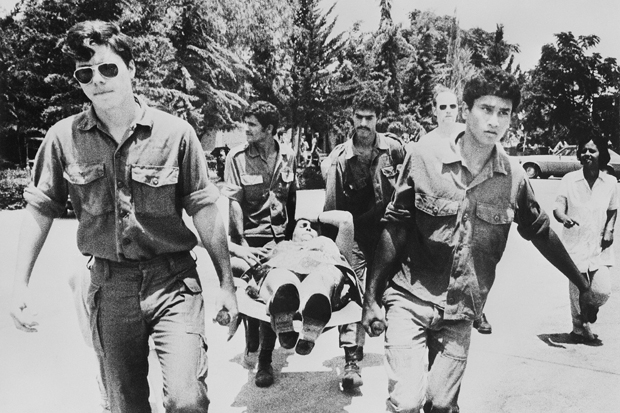Operation Thunderbolt was, Saul David contends in this gripping book, ‘the most audacious special forces operation in history’. In June 1976 Air France Flight 139, travelling from Tel Aviv to Paris via Athens, was hijacked above the Gulf of Corinth by two Palestinians from the Popular Front for the Liberation of Palestine and two Germans from the Revolutionary Cells, a violent leftist organisation connected to the Baader-Meinhof gang. Eventually landing in Uganda at Entebbe airport, the crew and passengers were guarded by Idi Amin’s troops while the president attempted to take credit for promoting negotiations. The demands were the release of 40 pro-Palestinian militants imprisoned in five countries, within 48 hours.
Forty years ago, when an average of three planes were hijacked worldwide every month, there was no international policy of non-negotiation with terrorists and few expected Israel to raid Entebbe airport to rescue the hostages. The flight was under French jurisdiction. Israel was thousands of miles away. The Israeli Defense Forces had never previously launched an operation outside the Middle East, and had neither sufficient time nor information to do so then. Yet even many of the younger Israeli hostages were opposed to negotiation on principle. What everyone appreciated, however, was that any rescue operation would require absolute precision, as well as great courage and conviction.
This book feels a little like a military operation too. Neatly marshalled into the eight days of the action, the narrative shifts between the sweltering heat of Entebbe airport, frosty cabinet meetings in Jerusalem and tense moments at various altitudes in international airspace. As the hours tick down towards the threatened bloody dénouement, tension mounts and the atmosphere thickens until the book itself feels appropriately claustrophobic.
Having interviewed people from all sides of the story, hostage, rescuer, politician, journalist and even (former) terrorist, David ensures that there is always space for the touching human detail. There was a ‘moment of farce’ in the hijacked plane, for instance, when some of the hostages felt compelled to draw the only female hijacker’s attention to the fact that two of her blouse buttons had come undone, presenting a view of her ‘rather feminine brassiere’. Minor panic ensued as she tried to adjust things without dropping either pistol or hand grenade, with one hostage wryly speculating that they might all die simply for modesty.
Three days later, on the ground at Entebbe, some non-Israeli hostages were released to promote negotiations. Among them 12-year-old Olivier Cojot bravely carried out his father’s detailed notes on the layout of the buildings, number and locations of the terrorists, guarding arrangements etc, hidden in the turn-ups of his jeans. On release, it was only after the next wash that he remembered the precious, and now illegible, information.
Such details make this book ring true, but it is the issue of identity that lies at the heart of the story. Once at Entebbe, the Israeli hostages — children among them — were separated from the others. They endured worse conditions, more violence, and no hope of early release. The German hijackers insisted they were anti-Israeli rather than anti-Semitic, but this nuance did little to impress Yitzhak David, a survivor of Auschwitz, who challenged them with the number tattooed on his arm. As the days passed, both the nationality and ‘racial appearance’ of the hostages became steadily more relevant to their chances of survival. Some older, immigrant Israelis ‘missed their old passports’, and Operation Thunderbolt was in part motivated by the need for Israel to retain credibility as a country able to defend its own; its very raison d’être.
The legacies of the rescue operation were manifold. Arguably setting the standard for counter-terrorism, Operation Thunderbolt also marked the beginning of the end for both Idi Amin and the violent left in Germany. As Max Hastings has written, with hindsight the operation might also be regarded as marking the high point of Israel’s international standing, after which failed diplomacy and brutal suppression drained support from their policies. Hastings contends that Operation Thunderbolt deserves to be remembered, however, as ‘one of the greatest feats of arms in a humanitarian cause since the second world war’. Saul David’s page-turner, with its single clear mission, cast of distinct personalities and very filmic scenes, should help ensure this is the case.






Comments